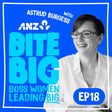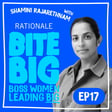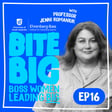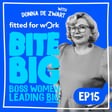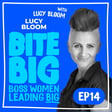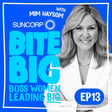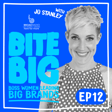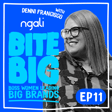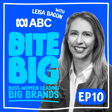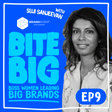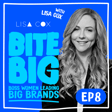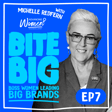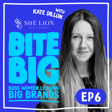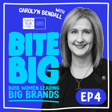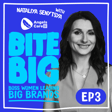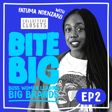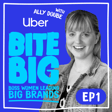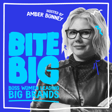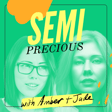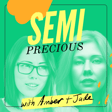Acknowledgment of Boon Wurrung country
00:00:00
Speaker
This podcast is recorded on the lands of the Boon Wurrung country and we wish to acknowledge them as traditional owners. We recognise First Peoples of Australia as the original storytellers of this country and pay our respects to Elders past, present and emerging.
Introduction to Episode Five of Bite Big
00:00:25
Speaker
Well, hello and welcome to episode five of Bite Big, a podcast about boss women leading big brands. I'm your host, Amber Bonney. And today
Meet Leah Morris: Gender Equality Champion
00:00:35
Speaker
I'm so grateful for the opportunity to chat face to face with gender equality champion, Leah Morris.
00:00:41
Speaker
Leah is a senior copywriter and founding editor of Mavens, which is an independent publication to champion gender equality through communications. Welcome and hello Leah.
Leah's Background and Move to Melbourne
00:00:51
Speaker
Leah, you grew up in the Victorian bush in the land of the Pangering people.
00:00:56
Speaker
Moving to Melbourne in 2014, you forged a career through valued mentorships with industry leaders who recognised your passion and hard work. Cutting your teeth in smaller agencies, but you've really had some significant big agency creds in the likes of Big Red, HBK and more recently at RGA.
00:01:14
Speaker
Really big portfolio of blue chip experience, including coal, Suzuki, steel, juleks, and Toyota. But your work with Mavens is definitely about community and social impact for the lens of big business change, which is amazing. I've got a little quote here about your peers who have described you as a natural collaborator who bring together strategy, craft, and chutzpah to every project you work on, no matter what the scale.
Leah's Heritage and Work Ethic
00:01:40
Speaker
Chutzpah, talk to me about that.
00:01:42
Speaker
Well, first of all, thank you so much for having me on the podcast, Amber. I'm so stoked to be here because I'm a big fan of your work and I'm really excited to see this podcast kick off when so many women and men want to learn more about gender equality and the kind of things that you will be talking about on this podcast.
00:02:00
Speaker
You're welcome. So chutzpah is a Yiddish word and my background is Jewish on my mother's side. So it's just a little nod to what I bring to my projects, which is this sort of boundless energy and passion and I guess a little bit of humility. I will work on any project no matter what size with a smile and love working with people. Well, I love that. That's perfect.
00:02:24
Speaker
Now we're here to talk about personal mantras.
Exploring Personal Mantras
00:02:28
Speaker
So the podcast, Bite Big, is based on, you know, hours of brainstorming with the women in my business at Edison around what should be the theme of this podcast. And one of the things that got thrown around was my expression and Mantra, Bite Big and Chew Like Hell. I love that.
00:02:46
Speaker
Thank you. And so the sentiment of this and every episode with all of our guests is really to get under the skin of what your personal mantra is.
Leah's Mantra: 'If it feels good, do it'
00:02:57
Speaker
And I'm very excited to say you've got a few to talk about, but the one that you landed on is if it feels good, do it, which is beautifully simple. And I'm really interested, given you had a lot of mantras and we can get to that in a second. How did you land on that?
00:03:14
Speaker
So this is something my late dad used to say to me. I was really close to my dad. He was an amazing guy. He grew up in Wangrada in Northeast Victoria, which is where I grew up. And if you catch a little bit of the accent, that's probably why. Wangar accent? Is that what it's called? Yep. But yeah, dad was
Father's Influence and Disability Advocacy
00:03:32
Speaker
amazing. He was a long time disability advocate. He had a stroke when he was 30 years old, just before I was born. Wow. Very young.
00:03:39
Speaker
Yeah, so he lived with what he called a funny walk, but it was really just a limp and his left arm didn't work, but he was an incredibly capable man. He used to drive Utes and cut down trees with a chainsaw and fix cars and do all the things he loved doing. Wang style. Wang style, exactly. So that was one of the mantras that he sort of taught me and he taught me a lot of
00:04:01
Speaker
wisdoms over the years, but it's really just about gut feel and intuition. At a glance, it kind of sounds a little bit hedonistic. It's like, oh, I'll just do whatever I want, even if it's bad for me or even if it hurts people. It's not about that at all. It's about really being able to have that self insight to be able to look inside and go, is this going to make me feel good? Does this feel right? And then being able to act on that to achieve a sense of purpose and fulfillment in everything that you do.
00:04:27
Speaker
That's amazing. I do love the simplicity of that, but certainly when I read that for the first time, I immediately went to intuition and often in business and in personal life, I think lots of people would resonate with the idea that you can overthink things and sort of.
00:04:42
Speaker
suppress your instinct on is this, does it feel good? And that's whether it's in, you know, a business decision, whether you're making a creative decision, whether it's about how you spend your time. I can definitely see how that can be applied. I mentioned before that you had quite the long list. Let's talk about some of those others and I'll read them out. Ask and you shall receive. Yep. That was one of dad's. That's a good one. How did that show up for you and your family?
00:05:12
Speaker
I guess, well, I'm one of four children and we grew up living below the poverty line and that kind of sounds like poor me, but I never really saw it that way. We were very close family, very well loved. Both my parents were on the pension, but we were never wanting for anything that we really needed. But it was just about being able to have the humility to ask for things, you know, like mum would be sometimes calling the electricity companies or asking for an extension on the bill.
00:05:38
Speaker
And that was fine, you know, and then when I sort of came up into the industry and my dad was sort of giving me advice, he would say, you know, ask for help. Don't be afraid to approach somebody that you think would make a great mentor or ask for a job or ask for more money. Ask for what you need. Exactly. Yeah. And I was not great at it, but I've gotten good at it. Better at it. Yeah. That's an amazing one. I like that. What can I not do next?
Prioritizing Life and Work
00:06:07
Speaker
What's this about? The sentiment is quite Zen. Kind of going back to what you said earlier about, you know, the sort of amount of stress and pressure that we can experience working in this industry. Sometimes it's not about making lists of things you have to do. It's about crossing things off that list that you don't need to do or that can be put aside in favor of something else that's more important to you like having dinner with my sister or, you know, even just going on a date or prioritizing things. Yeah. Yeah.
00:06:36
Speaker
Yeah. You know what? When my husband listens to this, he's definitely going to get out a highlighter and draw his own poster to say, this is what I need to be doing. I definitely, I can, I can hear him in the background. All right. I've got another one here. Done is better than perfect.
00:06:52
Speaker
I love this one, and this is actually something I only picked up in the last year. And it came from Lynn Depp, who's the founder of Assisterhood, which is one of our Mavens community partners. It's a wonderful mentoring organisation for women and marginalised genders, but Lynn is incredibly wise.
Overcoming Perfectionism
00:07:09
Speaker
She's younger than me, but I still consider her a bit of a mentor.
00:07:12
Speaker
She just spouted this one time when I was obsessing over something quite trivial and just said, you know, done is better than perfect. This is just something small. And I just let out this big breath and went.
00:07:23
Speaker
You're absolutely right. Why am I agonizing over this? I definitely have perfectionistic tendencies and this is something I try to practice. You know what? This is actually enough. It's enough. It doesn't have to be perfect. It's enough to get it out. All right. Next on the list, pick your battles.
00:07:42
Speaker
Yeah, this one was taught to me probably in my early years at the first big agency that I worked for. And we would sometimes come up against challenges, whether it was internal or external or work related or bureaucratic and political.
00:07:58
Speaker
But, you know, you've got a finite amount of energy in the day and how you choose to spend it is really important. And if you can master that by picking your battles, working out what it is you want to fight for and what it is that you can just say, water off a duck's back, then you're winning and you're in control. Yeah, I can actually see how all of these sort of work together. Last one, success is the best revenge. I've definitely felt like this when I've had a breakup with someone in there.
00:08:26
Speaker
I met someone else that's awesome. What's the sentiment of here? I think it's about not internalizing negative energy, you know, just being able to take an experience for what it is, move on and focus on yourself and go, you know what, it's not about you, it's about me and what I want for myself is to do well and to be happy.
00:08:46
Speaker
That's my revenge. I love it. It's amazing. Well, if it feels good, do it. This is actually the one that we're focusing on today. I want to talk about amplification and advocacy of women because I'm really keen to understand, I know our listeners would be to the journey of mavens, what it's about. And then at the end of that, actually talk about what the future of the mavens is.
00:09:09
Speaker
Yeah, absolutely. And probably one of my favourite topics. Let's go. We'll go. I'll sit back and have a sip of my coffee. Well, I guess the first question people might wonder is when did I start it and why did I start it? So it was my ISO project, so I guess you'd call it. We were in lockdown. Everybody was spending.
00:09:29
Speaker
a bit of time evaluating where they were in their lives. Some people with their career, some people bigger, you know, like with their partners or what they wanted to do that had some purpose and could sort of give back to the world. There was a real climate of altruism, I guess, and I was not left out of that. So I started thinking about my future, like my five year plan, my 10 year plan, 20, 30, 40, 50, like I was really going quite deep.
00:09:59
Speaker
And, you know, at 50 years old, I would really love to still be working. I'm a bit of a workhorse. I get a lot of joy out of it. Maybe it's because I'm a Taurus. I don't know. But, you know, women that are 50 plus in our industry, you look around, you really don't see many of them.
00:10:14
Speaker
No. And that just, first of all, didn't sit well with me because, you know, I see myself becoming that sort of Cindy Gallup type, hopefully one day. Oh, Cindy. Honestly, she's just the, she's right up there, isn't she? She's like one of the number one. She's incredible.
00:10:30
Speaker
kind of poster women for liberation in every area. Sexual liberation, liberation of your career, just absolutely giving it to anyone who, where she's calling out the industry for what it is.
00:10:45
Speaker
She's so powerful and she's fully earned that. And I think that's the wonderful thing about having older women around. It's like they do bring this gravitas that nobody else can bring that comes from decades of experience, but also their
Founding of Mavens During Lockdown
00:11:00
Speaker
unique experience as a woman in the industry. And I want that for myself. And if we don't change the industry now, I won't be able to have that.
00:11:09
Speaker
Yeah, what's that going to mean for you? Yeah, so that's kind of what kicked it off. And then I started to do a little bit more research and sort of uncover some statistics around the number of women in agency leadership, which I think was 27% at the time that I was doing the research, the rates of sexual harassment, the other issues that affect women, I guess, in the comms industry, specifically in Australia. And I was really distressed by what I was reading. And that sort of galvanized me to keep going with it.
00:11:36
Speaker
Yeah, it's incredible. I'm only a couple of years off 50, so it's a pretty harrowing prospect to think that women become more invisible. And I listened to a podcast recently by, what's Elaine's name from Seinfeld. Her whole podcast is about the wisdom of older women. So she interviews older women and I was listening to the Jane Fonda interview. I love Jane Fonda. Yeah, just such an incredible woman, but it was all around if women become invisible,
00:12:03
Speaker
when they're older than who do you have to mentor you? Who do you have to learn from and to show you the ropes? So certainly the work that you do with the Mavens and the impact that you're going to have is incredible in actually setting up those future decades. Thank you. So one of my favourite interviews that we've done through Mavens with
00:12:22
Speaker
was with Jane Evans who is a creative director who's based in London now but spent most of or a large portion of her career in Australia and it's called invisible to invaluable unleashing the power of midlife women but the interview that I did with her and the name of that article was why ageism against women can get fucked.
00:12:40
Speaker
Oh, I love that. I have not read that book, but I am definitely going to put that on my list of things to read because that's amazing. So Edison have worked with you in the past and we understand and certainly, you know, I'm a feminist and I've spent, you know, the good part of a last
00:12:57
Speaker
At least 10 years being a much stronger advocate for women and using my voice and my privilege really in this industry to be able to do that. I'm really interested in understanding for you what those signifiers are of impact that your work is having.
00:13:13
Speaker
Yeah, it's women like you that give me permission to do what I do because when I see you doing it and not getting backlash and actually getting this positive response and creating an impact, I can see that that's something I can do as well. So thank you so much for your work. Oh, well that's, thank you for saying that. It's.
00:13:30
Speaker
Yes, certainly not the reason I do it, but you know, one of the things that's really important in this industry is, and it sounds cliche, but the role model and the impact that Ripple affect that you have on other people. And as you said, you know, especially when you go onto more public forums like LinkedIn,
00:13:47
Speaker
you know, everyone's been at the other end of, you know, people jumping on the bandwagon and having a crack and often it just seems too hard to take on. And, you know, to be honest, it's one of the reasons I don't have a Twitter account is I actually think that mentally I wouldn't cope. Like, A, I'm mouthy, so I feel like
00:14:07
Speaker
I would just get on there and have a good old rant. And then, I suppose the energy that it takes to deal with that. And, you know, for anyone who follows Clementine Ford, I mean, how she has the strength, honestly, to keep going, knowing the vitriol that she gets exposed to by, you know, even professional, supposedly respectful men. And in sometimes women, women can be misogynists too, is quite amazing.
00:14:36
Speaker
Yeah. And also, like, you know, do we really want to support Elon Musk? Yeah, I know. And his collection of data.
00:14:44
Speaker
But yes, going back to the signifiers that you mentioned, I think it's twofold. We've got the human impact, which I can sort of share some little anecdotes about some of the women that we've interviewed and the effects that that had on our audience. And then our website is really successful. We get 13.2K impressions a month, which is very high. That's just, I guess, you know, the site coming up in Google searches and often that's page one.
00:15:08
Speaker
That's off of the back of a lot of SEO work that I've done on the site. And, you know, being a copywriter with that SEO experience has been that sort of little advantage that I've been able to bring to the project. So that's great. That's amazing. Well done because I think it took us.
00:15:24
Speaker
10 years to even get off page seven for our own website. Getting onto page one is amazing. It's hard. I'm not good at everything. I'll probably talk about our team soon and what they bring, but that is one little skill that I'm able to bring. In terms of the human impact, we often get feedback from women who have read
00:15:45
Speaker
our interviews and they're always expressing how grateful they are to the interviewees for their candour and their honesty because it takes courage to share your story, especially when that story involves vulnerabilities, I guess.
00:16:03
Speaker
A recent one we did with Beck Adjes. She's a brand focus marketer. She talks about her neurodivergence and discovering ADHD in herself. That's the first piece we've done on that topic. It had a great response. Lots of people coming forward and saying,
00:16:20
Speaker
Thank you for talking about that. I can relate to that. Also, a Magnus Rudesviedzo, who's a senior marketing consultant, she talks about the adversity that she experienced moving her career from Zimbabwe to Australia and how she overcame that. Again, it's quite a difficult topic and a really important one.
00:16:41
Speaker
And also Amelia Michaeloff, who is a agency founder of Makemate, but she speaks about the motherhood penalty and some of the experiences that she had when she was starting her family before founding her own agency in the end. But it's just women like those that sort of deliver the impact that, I guess, fuels me the most. To keep going. Yeah, to keep going.
Mavens' Impact and Partnerships
00:17:04
Speaker
Because even if it's just one person that says, this has changed my life, I mean, that's enough. That's incredible.
00:17:11
Speaker
I mean, I can't imagine not having Mavens now. It's like, I will send it to people and I will talk to clients about it. And, you know, just having that quick access point really with a very catchy name. I haven't actually even asked you about the name, but we'll get to that, is such an important resource. And I know in the industry, you know, you are now partnering with Never Not Creative. And I saw that you were at the design conference recently. I didn't run into you, which was a real shame, but there were hundreds of people there.
00:17:41
Speaker
I was having to pull out of that and I was devastated. Maybe that's why I didn't run into you. It was a decision that was really tough and it came down to, I guess, prioritising my mental health. I'm getting better at managing, I guess, my workload and Matthew, the founder, amazing guy, he'd given me a free ticket because we were sort of like a media partner with TDC.
00:18:02
Speaker
I was so excited. And in the end, I just went, if I go to this, I'm going to be towing the burnout line. Like I've got so much on. So Matthew gave me a digital streaming pass instead. Awesome. Yeah. Well, I hope you enjoyed it. I don't feel bad about not running into you now because you weren't physically there.
00:18:20
Speaker
I mentioned the Maven's name, talked to me a little bit about the brand expression. Yeah, it's a word, Cindy Gallop. Well, she gets labelled that a lot in press. I did not know that. Interesting. Yeah, I just always sort of associated that with her and it was one of her TED talks that sort of kicked off the seed of the thought during COVID that sort of
00:18:42
Speaker
got me onto this path. So that was a really positive association for me. But then once I started to look up the etymology of it, because of course, as a copywriter, you're right up there in the etymology. Yeah, I realised it had Yiddish origins, which is the language that my grandparents spoke in Poland. Interesting. And by definition, it's typically associated with women and it's just a word to describe someone who's really good at their job.
00:19:11
Speaker
Oh, that's awesome. Yeah. At the design conference, I heard a speaker, Caravo Poppi Molestain. Do you remember her talk? Yeah. Really powerful. But there was a quote that she said, well, she was posing a question really that I've since quoted. What was your good kind of angry?
00:19:30
Speaker
And I really love that. It sort of leans into this idea of having enough fire in your belly to create change and through that change you're having impact. Can you think of just the one point of good kind of angry? I mean, you've talked about a couple, but do you remember, you know, a moment even pre what you described during lockdown, sort of thinking about your in lockdown, obviously you were thinking about
00:19:59
Speaker
you know, end of career. Were there other moments in your career that where you kind of had that good kind of angry that started that fire burning? I think angry and good, they just kind of fight in my brain. So I kind of get confused by the question. A little bit. I suppose the way I interpreted the question was
00:20:22
Speaker
angry enough where it creates change, but not havoc. If you know what I mean. Like, cause you can get angry and just, you know, fly off the handle and, you know, go into a massive rant or you can kind of get angry a bit like success is the best revenge. Yeah. Where you can actually say, you know what? I'm angry enough that I'm going to convert this into a positive. That was sort of what I took from her.
00:20:47
Speaker
good, kind of angry, where it was about now I'm going to, it's kind of the seed of change, the wave of change. Yeah. I mean, I can think of a moment that really stuck in my brain that sort of, I come back to a lot when I'm
00:21:03
Speaker
thinking about why I started. And that was a moment where a really wonderful mentor of mine was going through a really tough time at work. She was getting undervalued, probably underpaid, passed up for promotion. And I was kind of watching from the sidelines as her, I guess her junior
00:21:23
Speaker
And she was a big role model for me, a wonderful copywriter. And we were in the kitchen one time, I was making coffee and she just dropped an egg on the floor because she was so stressed. She was making toast, dropped it. And then she just stood there. She didn't have it in her to like pick it up or clean it up. Like she was just so paralyzed. Yeah. Mentally.
00:21:46
Speaker
you know, wounded by everything that was happening at work. And that's when I realized what the industry can do to incredible, incredible women and how damaging that is, not just to them, but the women around them.
00:22:00
Speaker
Yeah. Yeah. So sad. So I remember cleaning up the egg and going, yeah, this is my good kind of angry, this is like, this is it. Yeah. Yeah. I mean, that is a lovely segue into reason for being. So why we exist and
00:22:18
Speaker
I don't come at that from a purpose washing perspective. I come at that from a personal motivation because I know that you talk about the Japanese philosophy of Ikigai and I was in Japan recently and I'm really keen to understand why that resonated with you and how sort of you stumbled across this philosophy.
The Philosophy of Ikigai in Leah's Life
00:22:40
Speaker
Yeah, so this is one that I learned when I was a delegate with Rare with Google, which I was fortunate enough to do two years in a row. It's a wonderful program. It's still running annually, I think. What is the program? It is a leadership accelerator for underrepresented talent. Awesome. Yeah. And it was started by Tara MacKenty and Stephanie Dijian Vincenzo. They're both creatives that
00:23:06
Speaker
I think Stephanie is at Meta now and Tara was at Google and has since moved recently. But they're both, I guess, incredible industry activists who have created a lot of change and were able to pass this program on to Google, who have were able to sort of scale it up and bring it to more people. And it's amazing. It's global. Yes, it's global. So there were delegates from India and New Zealand and Japan
00:23:33
Speaker
What an amazing experience. Yeah. And so throughout that program, there were several modules and this was one of them. And it's really, if you guys really just about how you can overlap, I guess what you're good at. Um, so your craft or your vocation, um, with what you can get paid for, of course, and what the world needs. Yeah. And that's the perfect balance.
00:23:57
Speaker
When I read that, I went and built my own little template. I haven't finished it yet, but I'd love to hear if you're open to sharing a little bit about yours. Yeah, absolutely. So I think vocation and profession is that, would that be creative advertising and then my profession's copywriter?
00:24:16
Speaker
And then my mission is to, I used to say it was just to champion women in creative advertising, marketing and media, but it's a little bit more than that. I've kind of geared it more towards building community now, because as I've been doing this for almost three years now, I think, or just over three years, that has been the biggest driver of impact, I think, is what happens when we work together.
00:24:43
Speaker
And then my passion, I suppose that is... You've probably got lots of passion. I do, but I have to say my passion and my profession are probably the same thing. I just love being a writer and an editor. So lots of overlap. Well, that's one of those skills, I suppose. I mean, it's a bit like designed. I trained as a designer and it's kind of like one of those
00:25:09
Speaker
It's not a nine to five thing, right? Like you don't just kind of finish, close the spreadsheet and move on and not be a designer. Like I'm looking at things all the time. I'm seeing design everywhere. My house, you know, from my clothes choices to like the design of the car to the design of the house are all kind of intrinsically linked. And I suppose for copywriting, I mean, you're reading
00:25:31
Speaker
everywhere so you would just be immersed in the world of writing and it's so linked to creativity as well. I love it. I love a TV show with a great script or even if I listen to the lyrics of a song you know it's just that the words are always what permeates my mind and keeps me entertained and busy and happy.
00:25:49
Speaker
Is there a show that's coming up for you now? Because I do need something for you to watch. Have you watched the split? No, I haven't actually. It's a, I think it's BBC. It's a drama about a woman who's going through divorce, which kind of sounds boring, but it's not. It's just so full of life. It's all women writers. It's the main character. Hannah is just so relatable and the actress is brilliant.
00:26:14
Speaker
All right, I'm going to get on to that. All right, so, icky guy. How does that link, do you think, to if it feels good, do it? I think when something ticks all those boxes, so like those ones that I mentioned, you know, what the world needs, what you're good at, where you can make money from, that's going to make it feel good. Yeah. And that's when you're going to sort of get that feeling in your chest that you know what to do and you can just do it without any stress. Yeah, without over cognising it.
00:26:43
Speaker
Yeah, exactly. You know, when I was looking up the icky guy, I mean, it's a tool that I've seen before, but when I was refreshing ahead of this conversation, you know, anything that's sort of some sort of Venn diagram where there's the blurring, if it feels good, do it. You know, you definitely get the sense of that's a lot of things coming together to trust that intuition, isn't it?
00:27:04
Speaker
Yeah. And we get gifted so much when we're growing up, like the values that I got from, you know, my family, my parents, the things that I learnt, you know, living in a household with, you know, a dad who was a disability advocate and a mum who was
00:27:21
Speaker
super charitable and generous and kind. Those are things that we should, you know, use because they're inside us. And if we just trust our gut, those are the things that will surface and determine our decision making. And that feels really good.
00:27:37
Speaker
You and I spoke before we started recording about the privilege that having design or creative or writing skills has and the ability to be able to use those skills to amplify a message. And when you blend that together with then entrenched values that you have from growing up and those experiences, you've got a pretty powerful platform for change, don't you? Yeah.
00:28:03
Speaker
Absolutely. It is a privilege, you know, and I completely understand people that don't speak out. You know, it's not always safe. And this is a point that Jasmine Badeer made at the Design Conference when she was talking about activism and advocacy and allyship and stuff like that. And that is an important point. You know, it's not always safe to speak up or take action. But when you are in that position of privilege and you can, you can really change the whole path for either an individual or a marginalised group.
00:28:33
Speaker
Yeah, exactly. And I think recently through the Edison business, we did an eight part training course with SBS on diversity and inclusion and definitely recommend that for anyone who hasn't done that through their business. It's a really amazing program where the content covers obviously all areas of diversity inclusion. But one of the things I was talking about was
00:28:57
Speaker
the idea in the interviewing process about currently, especially in Western environments, we're really set up for one type of person in the interview, right? It's people who can think quickly, they're charming, they're confident, like they're quick on their feet. That doesn't necessarily demonstrate capability to do a job. That just means that they have enough confidence to, to self advocate and they're like, got a good gift of the gab, right? That's basically what we're set up for.
00:29:25
Speaker
Yeah. And what that sort of triggered in me is this idea that not everyone is good at self advocating. And I had probably never stopped to think about that because I always have been actually just naturally quite good at self advocating. And so there's sort of an assumption that, you know, if you want something, well, certainly my personal assumption that in those situations that
00:29:52
Speaker
you would be able to make that happen. And what I realized is that it's even more of a reason for me where that is just an innate skill and I am pretty fiery so I can jump in. If I really don't agree with something, I can jump in and do that. And how important that is in our ecosystem of community that you've got people who will do that. And that doesn't mean that people who can't don't have their place, but it just means all the more reason that if they're the skills that you have, that you can be that champion and that voice to step up.
00:30:22
Speaker
Yeah, absolutely. And you can teach other people to do it by doing it. Like I said earlier, when I see people like yourself being quite bold and outspoken with their beliefs and the leadership that that sort of brings to the rest of the community, it's like permission to do the same. To do the same. Then we kind of group together and make a big impact together.
00:30:46
Speaker
Yeah, I love that.
Maintaining Humanity and Empathy as a Leader
00:30:48
Speaker
Well, being a brand boss, you know, when we set up this podcast and it was about, you know, boss women leading big brands, it's quite a tongue twister. I love an alliteration. Yeah. The idea of boss was something like we talked about a lot, the girls helped me put this together about what that actually means. And we tuned in for it and going, oh, is it two genders? Like in terms of, does it culturally skew to men? And then we're like, no, damn it. We're going to take ownership of that way.
00:31:16
Speaker
What does it mean for you with not only your professional career, for your paid work, but work with Mavens? What does that mean for you? The word boss? Yeah. Yeah. I think for me, it's being able to retain that humanity. So I think.
00:31:33
Speaker
there's a tendency to become somewhat cynical as we get older and we sort of go through the motions of client work and having negative feedback or having the creativity stripped out of our work over time, which is natural as we work in commercial creativity.
00:31:52
Speaker
Every project. Yeah. And I think some people are able to take that with a grain of salt and other people internalize it. And I think it could also come from people not working on their mental wellbeing or not taking care of other important parts of their life. And I think that the best bosses are the ones that are able to take care of themselves and lead happy and fulfilling lives because that's contagious and it makes everybody else, I guess, happier and more creative around them.
00:32:18
Speaker
but also just retaining that humanity. So being able to empathise and be patient and take someone by their hand, take them on a journey if they need to. These are sort of soft skills that often don't get valued as much in leaders, but they're things that I think make excellent bosses.
00:32:36
Speaker
Yeah. And certainly the trend, if you like, around leadership and management style is shifting now from being sort of a narcissistic control. Hyper macho. Yeah. Hyper macho. I'm just going to, it's all about the numbers and you know, we're starting to see, you know, the dial moving. Certainly not as
00:33:00
Speaker
quickly as we would like, but we're definitely starting to see that they are values that are being respected and demanded now in those senior leadership positions, which is awesome. And I think they're often values that are more associated with women, those softer skills as well. So for them to sort of come through as being recognised to increase productivity and staff retention and stuff like that is fantastic because it just goes to show that women do make great leaders and bosses.
00:33:28
Speaker
I do. I was reading an article this morning about the CEO of the Macquarie Bank. So it's the first female CEO of the Macquarie Bank. And apparently her salary is as low as any CEO has been paid since 1999.
00:33:42
Speaker
And I'm like, how is that possible? How is that possible? Like it really annoys me. You know, when you think about the CEO who left Australia post and how she was treated and even she took a salary that was, I think 40% less than the person exiting who had not done a good job. Plus he got paid a bonus. And then she came in, was paid less, but then was still, you know, went through the wringer.
00:34:09
Speaker
And then she went to Toll and got a massive pay rise because success is the best revenge. That is a beautiful segue. Thank you for getting back to that. I really loved that. I thought it was amazing. Although I do feel sorry for the new CEO of Qantas because I feel like that's going to be a total shit show.
00:34:25
Speaker
That's their first female CEO, isn't it? First female CEO, but like the brand is in the most dire straits it's ever been in. So to hand someone something. Yeah, I think they call that the glass cliff. Yeah. I heard of that phenomenon. No. It's where women typically can get appointed into roles where the business is flailing.
00:34:46
Speaker
So they just become the scapegoat. Yeah, they'll put women in those roles because it's too risky to put a good man in that job. It might be too detrimental to his career, so they'll just throw her under the bus. The plus side is if she wins, she's going to wow everyone, but it's not a great motivation. No.
00:35:07
Speaker
Oh well, it's a bit of a watch this space on that. All right, so if we think about the premise of bite big and this idea of a bee moment. We liked bees because a bite big had bees in it, boss has bees in it. I want to understand what's a moment that has had impact for you that starts with a bee?
00:35:28
Speaker
I'm going to go with brand because I think building Mavens as a brand was a big challenge for me. There's one person who made it entirely possible, and that's my art-directed designer friend, Vanessa La Delfa. Shout out to Vanessa.
00:35:46
Speaker
I was working with her at a boutique agency at the time that I launched Mavens and she was incredibly supportive. She was sort of the first person to really shout that support. Absolutely cheerleading every day, asking me how it was going, asking me what I was planning to do with it next.
00:36:05
Speaker
Yeah, she helped build the Mavens brand. I designed the logo, ironically. Good on you. Just using Adobe type kit, but I took it to her and I just said, can you kern these? Well, you knew what kerning was, of course, in copywriting. You've probably heard that. Yeah. That's impressive. Thank you. I knew that it had bad kerning when I did.
00:36:26
Speaker
But yeah, she's since sort of helped us rebrand my initial work, which we're gonna launch with our volume two edition. Oh, is that a watch this space? When is that
Launch of Mavens Volume Two
00:36:36
Speaker
dropping? Yeah, so we'll be launching the magazine in September and doubling our print run from last year, which is really exciting. Wow, that's incredible. And increasing the capacity for the launch event, which is great. So it's just growth on growth and so much of it is thanks to Vanessa, who designed the entire volume one magazine on her own voluntarily from scratch.
00:36:55
Speaker
Oh my God. And it is a beautiful magazine. That's incredible. It is a beautiful magazine. We have some here at Edison. How amazing. Double shout out to Vanessa. Yeah. All right. Before we wrap up, when we think about having impact and you spoke before about advocacy and being inspired by other people, and you know, we talked about Cindy, who's an inspiration to both of us.
00:37:19
Speaker
What is something that you wish that you could have either said to your younger self or had read or watched or listened to that would have inspired you then or that you wish you actually just learnt earlier? Yeah, there's probably a million.
00:37:38
Speaker
Maybe we just pick the first couple. Yeah. But I think a big one is, and I can't remember who told me this, but I'm still pretty grateful to them because it's really stuck with me, is not to apologize all the time. And I think it's something as women we're very socially conditioned to do. I certainly did it for the majority of my adult life. And it wasn't until I made a conscious effort to stop doing it that I really felt quite empowered and became more confident in the way that I speak.
00:38:06
Speaker
and write and interact with colleagues as well. And I would almost say it's what has sort of given me the ability to progress my career. I think if I was still apologizing for every little thing, I wouldn't be where I am today. And it sounds like such a small thing, but I think it's a huge thing. It's quite pervasive, the apology thing.
00:38:27
Speaker
I still sometimes, and I don't know if you have this experience, but I still reread my emails and I have to take out things that are still using words like just, and as a copywriter, like they're dismissive, right? They're personally dismissive. They're sort of diminishing the impact of what you're saying or diminishing your ability to say, this is what I need by using words.
00:38:51
Speaker
Yeah, just or maybe. Yeah, perhaps. Yeah, I still have to do that. Yeah. It's just so conditioned. Yeah. And there's a very simple alternative and that's just to thank people, you know, thank you for your patience. Not sorry. Sorry. Yeah. Yeah. Anything else you said? There's a couple I think.
00:39:11
Speaker
One thing I really struggled with when I was coming into the industry was the lack of industry books written by women. I remember reading Confessions of an Advertising Man by David Ogilvie and just thinking, this is so far from who I am. It doesn't resonate. Yeah, it did not resonate at all. Even though there was some really great concepts in there, I think he
00:39:36
Speaker
compares an agency to a commercial kitchen, which is quite funny. It was like labelling who was the chef, who was the situation. Hierarchy. Yeah, hierarchy, which helped me understand agency structure or traditional agency structure. But there was this book that was given to me by a tutor of mine, which is called Mad Women by Jane Mars. And that was an account of an ad woman who lived through, I guess, the golden age of advertising in Madison Avenue in the 50s.
00:40:03
Speaker
And it's pretty much what you'd expect if you've watched Mad Men. But it's from a woman's point of view. And it showed me where we were in our comeuppance, if you will, from the days of Madison Avenue to where women are now in this industry. If we think about the 50s to now, that's a long time ago, 70 plus years.
00:40:28
Speaker
Do you think we're moving reasonably slowly or do you think in the scale of human change? And I had this debate with my dad and my sister over the weekend around human's capacity for change and I used the
00:40:45
Speaker
analogy of, well, humans have adapted to technology pretty quick. So why is other cultural change not adapted as quick? And that I felt like the point I was trying to make was the patriarchy, there's no benefit to them to adapt change and therefore it's much slower. So advancing women is much slower, yet we're adapting to technology
00:41:07
Speaker
And, you know, we're now in the AI and therefore humans do actually have the capacity to change quickly, but certainly not engendered topics. How do you feel about that?
00:41:16
Speaker
The timeline is a tricky one because there's so many things you can compare it to that have taken longer or shorter. Yeah, exactly. But I think where we are now is so confusing because on one hand you have these terrible humans like Andrew Tate and his brother Tristan, who I think have literally just been convicted today. Hallelujah. And can I just say, because I've got adult
00:41:43
Speaker
teenage boys. And like this has been like a live discussion. And to have a feminist mother and boys who follow Andrew Tate was like quite a shock. Like it's infiltrating everywhere. And to have that discussion. And I recently saw, I think it was Clementine Ford, she posted like a response, like the perfect response to when boys talk about. Yeah, I saw that. Yeah.
00:42:09
Speaker
Yeah, it's tough because I think people can be good and bad. I really believe that. So I have people in my life that think Andrew Tate made a good point about something and I'm really upset by that. Yeah.
00:42:24
Speaker
But I think that's the confusion. It's like, there's that. And then on the other hand, I've got men in my life who really support the work that Mavens is doing and people like our RGA CEO, Michael Tichel, who sort of repost things that we share on LinkedIn and has been a big supporter, always attending our workshops and stuff. And then we've got
00:42:43
Speaker
Steven Namo, who's a friend of mine who volunteered at our last event. Amazing. He's an experienced strategy director. He also helped us create our strategy for this year. So you've got this spectrum of not allies. Yeah, unallies, let's just say. Yeah, adversaries. But I think at the core, it's about getting men on board. And that's why I love the work that Jasmine Badeer, who I mentioned earlier, does with her organization, Fuck the Cupcakes.
00:43:12
Speaker
I just love that name. It just says it all. Yeah. And the work that Andy Wright does with his... Never Not Creative. Never Not Creative and the men's groups that he runs as well. So I think that to me, just to boil it down, our ability to onboard male allies will determine the speed at which we can achieve gender equality in my view. And of course, and then you've got the cultural lens, right? That's probably coming from a Western perspective. Yeah.
00:43:39
Speaker
There are other cultures that are well, well behind even where the Western world is in terms of rights and freedoms.
00:43:47
Speaker
Yeah, well, I don't want to drag the moment down by, um, where the world's at, but I definitely think, you know, certainly my impression of, of people like you Leah and other women doing great things is that you're really just setting a course for future change and for impact and, you know, to help other people see a what's possible and also about educating people. So what's possible is the inspiration. And then the other parties are just having the facts.
00:44:15
Speaker
And certainly I know in communicating with boys and men, sometimes the facts are actually get the most cut through the stats, like leading with data so that you've kind of got head and heart coming together. I think, you know, that's certainly what your website does, which is really amazing. Thank you. And I think, you know, you mentioned that education
00:44:36
Speaker
of others, it's education myself as well. It's a journey that I'm on where I learn more every day and that's making me a better copywriter, a better human. Maybe one day it'll make me an excellent mother. Who knows? This is growing me as much as it's growing the community and the people around me.
00:44:57
Speaker
Well, we're so blessed. Well, I'm blessed and I know the listeners will be blessed once they've listened to it. Thank you. Thank you for being here. This is the first time that, ironically, we've actually met in person, so it was very, it's been beautiful to see your face. And thank you for being just such a boss in general, but certainly in helping co-host this today.
00:45:16
Speaker
and for showing us your version of biting big and aspiring to your many mantras, but certainly if it feels good, do it. I wanted to do a little recap and there's a couple of things that you spoke about. I really loved the vulnerability of how you've talked about your background and how that shaped you because I think we live in a society where
00:45:37
Speaker
it's very much focused on privilege and I've lived in a few places around the world and certainly I lived in South Australia and in South Australia the first thing they say to you was what school did you go to? It's very status led over there and also sorry for any South Australian listeners but also quite a patriarchal society so it's a bit of a boys club and so hearing people talk about coming from really diverse backgrounds is actually really important because
00:46:06
Speaker
there are lots of socioeconomic barriers in culture. And it's really important that we demonstrate, A, the value of education, but B, that people can come from all different types of backgrounds and achieve success based on what they define
Diverse Experiences and Innovation
00:46:20
Speaker
as success. So thank you for that sense of self and confidence. And I know that they're not things that are always easy to talk about.
00:46:28
Speaker
Yeah, I couldn't agree more. I think we're in the business of creativity and we need, you know, diverse individuals with diverse experiences all sitting around a table and having discourse that shapes interesting creative work. So diversity is really...
00:46:44
Speaker
something that we owe to our clients because if we don't have it, we can't create innovative work. And one thing that I learned when we were doing the Rare with Google program that I mentioned is that all these little things that sort of make you individual can be like a superpower because that is what you can then sort of bring that nobody else can bring to the work that you're doing or the relationships that you have in your career.
00:47:09
Speaker
So for me, you know, having a dad with a disability who was also a disability advocate makes me quite sensitive when I watch ads to how those groups are being represented. Yeah. And often I'll notice others won't pick that up. And it's not because they don't care. Just not on their radar. Exactly. No. And that's why I suppose
00:47:29
Speaker
the idea of having different seats at the table is actually about not only representing a decent cross-section of our community, right? And especially when you're in the creative industry, we're not designing for ourselves, right? We are one of the most niche audiences that there is. You're designing for mostly mass market and looking at the portfolio of brands that you've worked on. I know you've worked big and small, but
00:47:52
Speaker
you know, in those big brands, it's really mass market. And so having a humility is a note that I wrote here is something that you've talked about and empathy are really important traits and actually speaking to people and making those connections.
00:48:05
Speaker
Now, what's important about this podcast, which is specifically relevant to you. So we're produced and made and written by women and edited by women. And to show our gratitude, we donate $500 on your behalf. And the charity that you've chosen to support is Ready Set. And I'd really love to hear how you came across this charity and why it's got significance for you.
00:48:27
Speaker
Yeah, so Ready Set were introduced to me when we were looking for a charity partner for our Volume 1 magazine launch. Essentially, they provide clothing and job coaching to people in need. They're quite local to Melbourne, but they've got a wonderful team, dedicated volunteer team. I just love that
00:48:47
Speaker
they cite dignity as one of the things that they bring to their clients. Because I think, you know, I guess having grown up without having had a lot and never feeling like I didn't have dignity, but
00:49:03
Speaker
others trying to make me feel like I shouldn't, that I wasn't entitled to it or that it somehow made me lesser. A huge portion of the country lives below the poverty line. And I think we forget that when we live in our little bubbles, you know, like I'm quite comfortable now. I'm a senior copywriter. I can pay my mortgage. I can pay my bills and buy the things that I need for myself. But not everybody has that.
00:49:25
Speaker
No. And certainly in the current economy, it's just getting even increasingly more different. Yeah. And I think, you know, some people will say like people on welfare, you know, hate the term dull bludges, um, cause these people aren't, you know, they might, they might have a mental illness that's preventing them from being able to work or disability, or they might be trying to get work and not able to and Ready Set really helps those people that want to get jobs, um, to get into the workforce and be able to make a living for themselves and their families.
00:49:54
Speaker
That's amazing. I really respect organisations like that. So I haven't been familiar with Ready Set, so I'm definitely going to check them out and suggest that everyone else is listening does that. Well, thank you. It's been an absolute privilege to have you here and witness your energy and your passion and your humility. So thank you. Thank you, Amber. And I'd just like to say a massive thank you to Edison Agency as well for being
00:50:20
Speaker
One of our sponsors this year for Maven's 2023 Volume 2 magazine launch, which we're very excited to release in September this year as the September issue, because we're glamorous. Yay! Well, this will be coming out, I think, in August, so it'll be a perfect time for everyone to jump on board. Ooh, how exciting. Yeah. Perfect timing. Well, I'm your host, Amber Bonney, and until next episode, I hope you bite big and chew like hell. Thanks, everyone. Bye.

